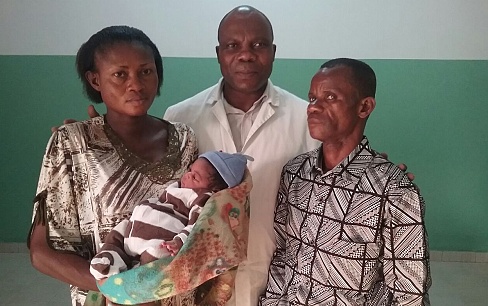
Aug 23, 2016 | Focolare Worldwide
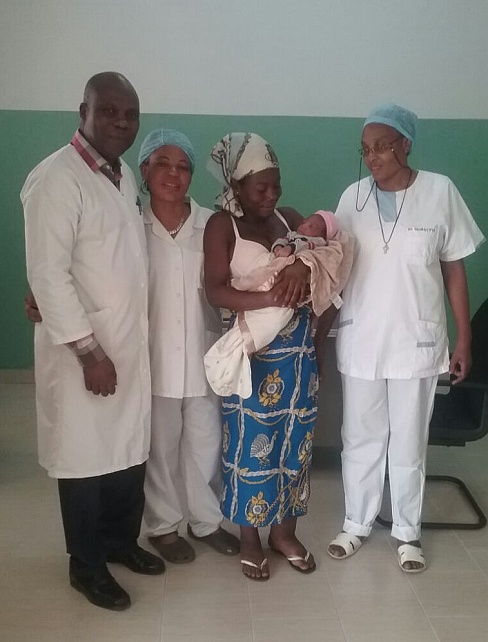 Taking two years to build, with costs that reached €409,559, the new maternity wing of the Medical Centre, “Moyimwa Ntongo” in the Congolese capital was inaugurated precisely on the Centre’s 10th anniversary. The first infant was born last 29 April! It is an essential service, considering that – as the Health Director, Arthur Ngoy affirmed – the mortality rate of infants and mothers in Congo are still very high:”846 maternal deaths over every 100,000 live births” – while the world average is 216 – “and 104 out of 1,000 are the deaths of infants”, one of the highest rates worldwide. “The new department was built through the efforts of several people and agencies related to the Focolare Movement such as the Giancarlo Pallavicini Foundation; Albina Gianotti and Victorina Giussani who have been sponsors of the Medical Centre since the beginning; AMU-Luxembourg and AECOM Congo along with their supporters; many people in Luxembourg, including children who have made and sold small knick-knacks and done odd jobs to earn some money even in winter.” “This medical centre gives us the opportunity to respond concretely to the invitation of the Church in the document, AfricaeMunus (n.140), that urges all the healthcare institutions of the Church and all the people working in these organisations in the most varied roles, to try to see in every patient,a suffering member of the Body of Christ,” affirmed Damien Kasereka, co-director with Ghislaine Kahambu, of the Focolare Movement in Congo.
Taking two years to build, with costs that reached €409,559, the new maternity wing of the Medical Centre, “Moyimwa Ntongo” in the Congolese capital was inaugurated precisely on the Centre’s 10th anniversary. The first infant was born last 29 April! It is an essential service, considering that – as the Health Director, Arthur Ngoy affirmed – the mortality rate of infants and mothers in Congo are still very high:”846 maternal deaths over every 100,000 live births” – while the world average is 216 – “and 104 out of 1,000 are the deaths of infants”, one of the highest rates worldwide. “The new department was built through the efforts of several people and agencies related to the Focolare Movement such as the Giancarlo Pallavicini Foundation; Albina Gianotti and Victorina Giussani who have been sponsors of the Medical Centre since the beginning; AMU-Luxembourg and AECOM Congo along with their supporters; many people in Luxembourg, including children who have made and sold small knick-knacks and done odd jobs to earn some money even in winter.” “This medical centre gives us the opportunity to respond concretely to the invitation of the Church in the document, AfricaeMunus (n.140), that urges all the healthcare institutions of the Church and all the people working in these organisations in the most varied roles, to try to see in every patient,a suffering member of the Body of Christ,” affirmed Damien Kasereka, co-director with Ghislaine Kahambu, of the Focolare Movement in Congo.  “It is a huge satisfaction, “Dr Ngoy commented, “especially for the mothers who had to be transferred to another facility to give birth, after nine months of prenatal checkups in our centre.They felt they were being abandoned just when they most needed us.But it is also because we can respond to the Congolese government’s request to offer complete, continuous and quality treatments. This is why we thank Chiara Lubich who established this centre.” At the inauguration last 9 July,together with the medical team, patients, civil and religious authorities, architect and his team, and journalists, there was also a small delegation from AMU Luxembourg. The thanksgiving mass was celebrated by the auxiliary bishop of Kinshasa, Bishop Bodika, while the ribbon was cut by the Health Minister, Vital Kabuiku, together with the Apostolic Nuncio, Luis Mariano Montemayor, and the auxiliary bishop.
“It is a huge satisfaction, “Dr Ngoy commented, “especially for the mothers who had to be transferred to another facility to give birth, after nine months of prenatal checkups in our centre.They felt they were being abandoned just when they most needed us.But it is also because we can respond to the Congolese government’s request to offer complete, continuous and quality treatments. This is why we thank Chiara Lubich who established this centre.” At the inauguration last 9 July,together with the medical team, patients, civil and religious authorities, architect and his team, and journalists, there was also a small delegation from AMU Luxembourg. The thanksgiving mass was celebrated by the auxiliary bishop of Kinshasa, Bishop Bodika, while the ribbon was cut by the Health Minister, Vital Kabuiku, together with the Apostolic Nuncio, Luis Mariano Montemayor, and the auxiliary bishop.
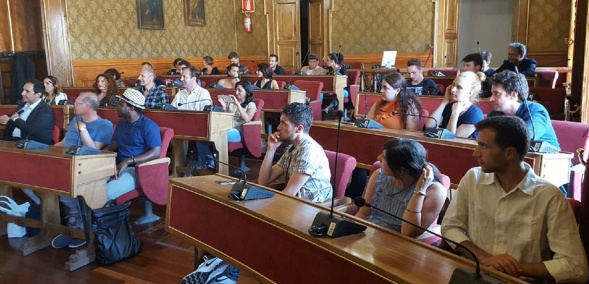
Aug 22, 2016 | Focolare Worldwide
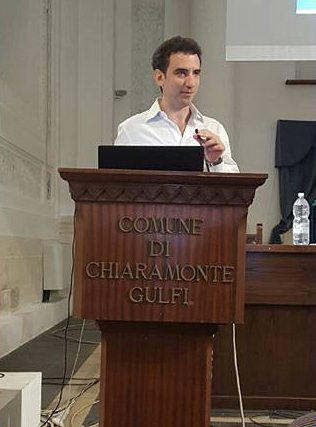 “We live in a world where anxiety and fear are inwardly and also physically destroying us. Let’s try together to bring about a rebirth of goodness and constructive relationships in the pursuit of the common good. I know we’re only like a small drop in the ocean, but just think of a drop of dye when it’s added to a bit of water: the water moves towards the colour of the dye.” This is how Manfred, who attended the Summer School, summarized the event that was organized by Communion and Law in Chiaramonte Gulfi, Italy. Thirty young people from Nigeria, Spain, Germany, Holland and Italy met to discuss: “Law in Europe: Welcome and Rejection: Immigration, Security and Environment”. The final report, which was framed by the university professors and young people themselves, highlighted the deep connection between the lack of protection of the environment that is sometimes the result of “invisible wars” and many armed conflicts – and the subsequent immigrations. Apollos, a Nigerian refugee, brought us into the dramatic experience of being refugees, helping us to make our own their expectations for justice and finding hope for them. The FO.CO. Cooperative that operates in Chiaramonte Gulfi and in other Sicilian cities is one of those roads of hope. Its goal is to obtain diplomas and jobs for refugees, and help them integrate into society. The Chiaramonte experience is bearing fruits in peaceful lives. The dialogue with public institutions was also important. We were received in the Council Chamber of the City of Ragusa where the president of the City Council and some councillors took part in an open discussion with us about the situation of the environment, recycling and citizen involvement in public institutions.
“We live in a world where anxiety and fear are inwardly and also physically destroying us. Let’s try together to bring about a rebirth of goodness and constructive relationships in the pursuit of the common good. I know we’re only like a small drop in the ocean, but just think of a drop of dye when it’s added to a bit of water: the water moves towards the colour of the dye.” This is how Manfred, who attended the Summer School, summarized the event that was organized by Communion and Law in Chiaramonte Gulfi, Italy. Thirty young people from Nigeria, Spain, Germany, Holland and Italy met to discuss: “Law in Europe: Welcome and Rejection: Immigration, Security and Environment”. The final report, which was framed by the university professors and young people themselves, highlighted the deep connection between the lack of protection of the environment that is sometimes the result of “invisible wars” and many armed conflicts – and the subsequent immigrations. Apollos, a Nigerian refugee, brought us into the dramatic experience of being refugees, helping us to make our own their expectations for justice and finding hope for them. The FO.CO. Cooperative that operates in Chiaramonte Gulfi and in other Sicilian cities is one of those roads of hope. Its goal is to obtain diplomas and jobs for refugees, and help them integrate into society. The Chiaramonte experience is bearing fruits in peaceful lives. The dialogue with public institutions was also important. We were received in the Council Chamber of the City of Ragusa where the president of the City Council and some councillors took part in an open discussion with us about the situation of the environment, recycling and citizen involvement in public institutions.  We were struck to hear Pope Francis speak at the WYD about the same topics that we were discussing: the war in Nigeria, the struggle for natural resources; the walls of fear, the need of a new culture, the courage to build bridges beyond our differences and relationships that are respectful of the dignity of every human being. Our own diversity was enriching: not all of us at the school were legal experts, and this allowed for an open and not exclusively technical discussion that was more accessible to the young people. One philosophy teacher remarked: “I think this summer school is a good synthesis, the way it constantly connects theory with daily life. This synergy seems very important in my opinion: theory is useful, but then it needs to be married to daily living.” Christian, the young lawyer and Deputy Mayor whose efforts had largely led to the success of the Summer School, concluded by saying: “It was possible to hold the school here, thanks to the work and precious contribution of many people, and it is something that should continue. It was an experience that went beyond every rosy forecast and that has left a mark: ‘seeds’ of a new culture. This opportunity to meet with other young lawyers was a moving professional experience for me. Their serenity, their sense of duty…. In such a fast-moving world, this is the real challenge: to share ourselves with others.”
We were struck to hear Pope Francis speak at the WYD about the same topics that we were discussing: the war in Nigeria, the struggle for natural resources; the walls of fear, the need of a new culture, the courage to build bridges beyond our differences and relationships that are respectful of the dignity of every human being. Our own diversity was enriching: not all of us at the school were legal experts, and this allowed for an open and not exclusively technical discussion that was more accessible to the young people. One philosophy teacher remarked: “I think this summer school is a good synthesis, the way it constantly connects theory with daily life. This synergy seems very important in my opinion: theory is useful, but then it needs to be married to daily living.” Christian, the young lawyer and Deputy Mayor whose efforts had largely led to the success of the Summer School, concluded by saying: “It was possible to hold the school here, thanks to the work and precious contribution of many people, and it is something that should continue. It was an experience that went beyond every rosy forecast and that has left a mark: ‘seeds’ of a new culture. This opportunity to meet with other young lawyers was a moving professional experience for me. Their serenity, their sense of duty…. In such a fast-moving world, this is the real challenge: to share ourselves with others.”

Aug 20, 2016 | Focolare Worldwide, Senza categoria
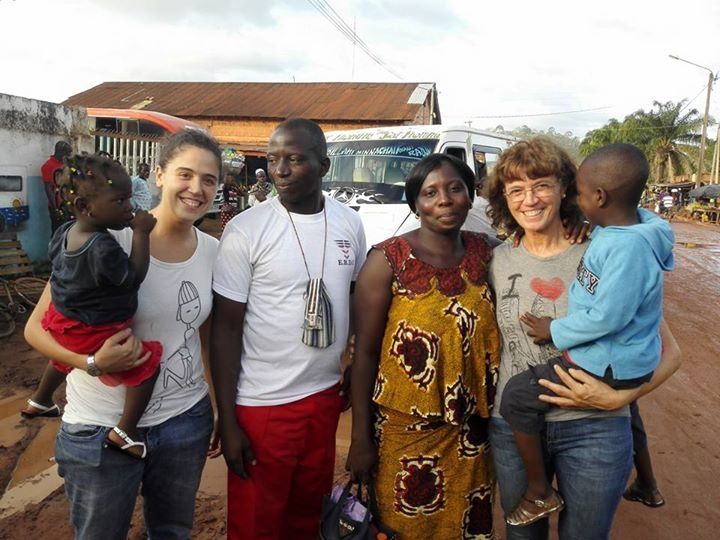 At the beginning of July, at the “Villaggio del Ragazzo” (Teens’ Village) of San Salvatore di Cogorno (Province of Genoa), the “Premio Bontà Don Nando Negri 2016” (Goodness Prize 2016 Fr Nando Negri) was awarded to Veronica Podestà, a young Italian nurse who works at the Benedetto Acquarone Centre in the town of Chiavari, Liguria. Out of her commitment, her enthusiasm, and her tenacity, Veronica could give to Daniel (a boy from Ivory Coast suffering from Tetralogy of Fallot (TOF) congenital heart defect, the opportunity to undergo a surgical operation at the Hospital of Massa, in Northern Italy. Veronica lives in Graveglia di Carasco, a little town of Eastern Liguria overlooking the Entella stream: “Since I have started studying,” she says, “I had a dream: to put my professional competence at the service of others. In 2013, when I had just graduated, I immediately wanted to leave for Africa. Thanks to the advice of a friend, I realized there was a chance to go to Man, Ivory Coast. At first I was supposed to stay only three months, but once there, the months of my staying multiplied! At first it was hard because I did not speak French. Yet, I found out that the universal language is that of Love. Concrete gestures build bridges much more than words.” Veronica goes on sharing and it becomes clear that it was an incredible experience. “At some point, with some girls we decided to organize a small business to sell some items. For several months, after work, we met to craft necklaces, bracelets, etc., and to collect all superfluous items in our homes. The proceeds were put into a common fund to be used in the event of economic problems, or to finance someone’s studies, and so on … One day, one of the girls shared a major difficulty: her father had not received his salary and her family had nothing to eat. All of us agreed to allocate part of the common fund to help her family. I saw a Gospel which was put into practice, and not just contemplated !”.
At the beginning of July, at the “Villaggio del Ragazzo” (Teens’ Village) of San Salvatore di Cogorno (Province of Genoa), the “Premio Bontà Don Nando Negri 2016” (Goodness Prize 2016 Fr Nando Negri) was awarded to Veronica Podestà, a young Italian nurse who works at the Benedetto Acquarone Centre in the town of Chiavari, Liguria. Out of her commitment, her enthusiasm, and her tenacity, Veronica could give to Daniel (a boy from Ivory Coast suffering from Tetralogy of Fallot (TOF) congenital heart defect, the opportunity to undergo a surgical operation at the Hospital of Massa, in Northern Italy. Veronica lives in Graveglia di Carasco, a little town of Eastern Liguria overlooking the Entella stream: “Since I have started studying,” she says, “I had a dream: to put my professional competence at the service of others. In 2013, when I had just graduated, I immediately wanted to leave for Africa. Thanks to the advice of a friend, I realized there was a chance to go to Man, Ivory Coast. At first I was supposed to stay only three months, but once there, the months of my staying multiplied! At first it was hard because I did not speak French. Yet, I found out that the universal language is that of Love. Concrete gestures build bridges much more than words.” Veronica goes on sharing and it becomes clear that it was an incredible experience. “At some point, with some girls we decided to organize a small business to sell some items. For several months, after work, we met to craft necklaces, bracelets, etc., and to collect all superfluous items in our homes. The proceeds were put into a common fund to be used in the event of economic problems, or to finance someone’s studies, and so on … One day, one of the girls shared a major difficulty: her father had not received his salary and her family had nothing to eat. All of us agreed to allocate part of the common fund to help her family. I saw a Gospel which was put into practice, and not just contemplated !”.  It was not always easy: “Sometimes I missed my family, my friends, my habits … but the sky remained always my best friend. When I felt alone, or I had a pain that I could not overcome, I looked up and, looking at the sky, I got lost into the immensity of creation. How much harmony, how much love in everything that was around me … and that Love was for me too!“. And she continues her story: “During my experience in Africa I got to know a boy who had a heart defect at birth. Every time he came, Daniel illuminated our dispensary with a gorgeous smile. Although he had to undergo invasive treatments, the love and joy he emanated were diffusive and contagious. Despite our great efforts, there was a long way to go. He needed more care and more appropriate interventions ….” After a year, Veronica’s experience is over and, upon returning home, she found a surprise: “When I got home, I found all my friends waiting for me in the garden for a surprise party. I was excited and so happy to meet all the people I loved so much. But inside I could not forget about Daniel’s smile when I said goodbye to him. I could not leave him alone … With some friends, then, we set out to see if it was possible having him operated in Italy.” Veronica’s enthusiasm is contagious. After a few weeks, together with her family and friends she organized a fund-raising dinner to allow Daniel to come to Italy for the operation. A month later, Daniel arrived in Italy accompanied by his father and Carlo (a focolarino who had been helping them with all the paperwork). “Two very intense months followed. Thanks to Daniel’s smiles, our respective cultures got enriched and we rediscovered them. Through his eyes I rediscovered the sea, the snow, and the joy of living the present moment.” Meanwhile, Daniel had been successfully operated. His dad had promised him a bicycle if everything would be fine. After the operation, however, he realizes that it was an expensive gift for them to afford… Yet, the love of the community had immediate effects: “Precisely the same night in which Daniel’s father confided to me his difficulty, a friend of mine brings me an envelope. At her birthday party she had presented the story of Daniel. Her friends, instead of gifts, had collected the money just for him. And, incredibly, the envelope contained exactly the sum which was needed to buy the bicycle that Daniel desired so much!” It’s time to say goodbye. We ask Veronica what she learned from this experience. She replies with a wonderful smile, “I had left Italy with the conviction that I had so much to give. And instead, I realized that, every day, I received a lot more than I gave… Often we start with the idea of changing the world; but we realize that in order to do so, we must begin by changing ourselves and our way of being with others. Only by building, moment by moment, bridges of brotherhood we can change the world and enlighten it with many smiles.” Just like Daniel’s smile.
It was not always easy: “Sometimes I missed my family, my friends, my habits … but the sky remained always my best friend. When I felt alone, or I had a pain that I could not overcome, I looked up and, looking at the sky, I got lost into the immensity of creation. How much harmony, how much love in everything that was around me … and that Love was for me too!“. And she continues her story: “During my experience in Africa I got to know a boy who had a heart defect at birth. Every time he came, Daniel illuminated our dispensary with a gorgeous smile. Although he had to undergo invasive treatments, the love and joy he emanated were diffusive and contagious. Despite our great efforts, there was a long way to go. He needed more care and more appropriate interventions ….” After a year, Veronica’s experience is over and, upon returning home, she found a surprise: “When I got home, I found all my friends waiting for me in the garden for a surprise party. I was excited and so happy to meet all the people I loved so much. But inside I could not forget about Daniel’s smile when I said goodbye to him. I could not leave him alone … With some friends, then, we set out to see if it was possible having him operated in Italy.” Veronica’s enthusiasm is contagious. After a few weeks, together with her family and friends she organized a fund-raising dinner to allow Daniel to come to Italy for the operation. A month later, Daniel arrived in Italy accompanied by his father and Carlo (a focolarino who had been helping them with all the paperwork). “Two very intense months followed. Thanks to Daniel’s smiles, our respective cultures got enriched and we rediscovered them. Through his eyes I rediscovered the sea, the snow, and the joy of living the present moment.” Meanwhile, Daniel had been successfully operated. His dad had promised him a bicycle if everything would be fine. After the operation, however, he realizes that it was an expensive gift for them to afford… Yet, the love of the community had immediate effects: “Precisely the same night in which Daniel’s father confided to me his difficulty, a friend of mine brings me an envelope. At her birthday party she had presented the story of Daniel. Her friends, instead of gifts, had collected the money just for him. And, incredibly, the envelope contained exactly the sum which was needed to buy the bicycle that Daniel desired so much!” It’s time to say goodbye. We ask Veronica what she learned from this experience. She replies with a wonderful smile, “I had left Italy with the conviction that I had so much to give. And instead, I realized that, every day, I received a lot more than I gave… Often we start with the idea of changing the world; but we realize that in order to do so, we must begin by changing ourselves and our way of being with others. Only by building, moment by moment, bridges of brotherhood we can change the world and enlighten it with many smiles.” Just like Daniel’s smile.
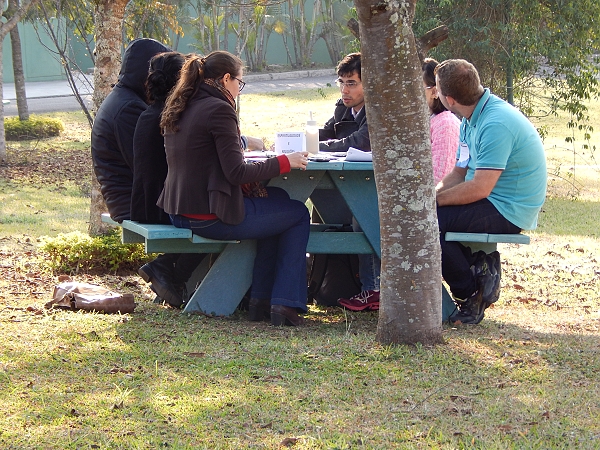
Aug 19, 2016 | Focolare Worldwide
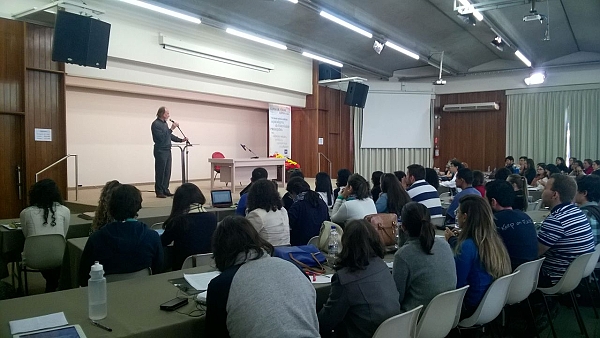 “I was totally demotivated in my profession as an engineer…Now I have rediscovered its importance in another light…” “I am in my second year in architecture. The university presents it in a very commercial light, where the human aspect is missing. This course has exceeded my expectations.” These were just two of the many impressions expressed by the 80 Latin-American university students at the end of the intense week of the course (25-30July), at the Mariapolis Ginetta Congress Centre close to Sao Paulo, Brazil. This cultural initiative promoted by the Sophia Latin-American Academic Centre (ALC) of the Focolare Movement, was an innovative project, well expressed by its title: “The theoretical-practical fundaments of the paradigm of fraternity, projected in the social, political, economic and cultural sciences.”
“I was totally demotivated in my profession as an engineer…Now I have rediscovered its importance in another light…” “I am in my second year in architecture. The university presents it in a very commercial light, where the human aspect is missing. This course has exceeded my expectations.” These were just two of the many impressions expressed by the 80 Latin-American university students at the end of the intense week of the course (25-30July), at the Mariapolis Ginetta Congress Centre close to Sao Paulo, Brazil. This cultural initiative promoted by the Sophia Latin-American Academic Centre (ALC) of the Focolare Movement, was an innovative project, well expressed by its title: “The theoretical-practical fundaments of the paradigm of fraternity, projected in the social, political, economic and cultural sciences.” 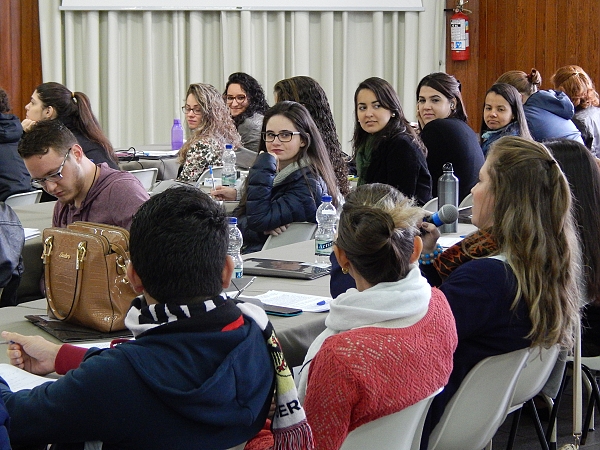 The Latin-American youths penetrated deeply into the wounds that still afflict their peoples: the socio-economic crisis, drama of the indigenous populations, and great issues of the Amazon, the social inequality and violence, of which,” as the Argentine political expert, Juan Esteban Belderrain, commented, “Latin America holds the said world title. In 2012 the number of homicides rose to over 140,000, one third of the world index and over 50,000 in Brazil alone. This sad phenomenon is on the rise. Against this dramatic background the course members delved into the cultural novelty introduced into their own disciplines, to imbue thoughts and lifestyles with the concrete activation of the paradigm of fraternity. For example, as explained by the Brazilian professor, Marconi Aurélio, and Political Sciences professor, Silva, with the application of this paradigm already practised for 20 years, politics overcomes the conflicting dimension, majorities and oppositions are viewed as complementary, part of the truth can also be gathered from opponents, and the participation of citizens is activated.
The Latin-American youths penetrated deeply into the wounds that still afflict their peoples: the socio-economic crisis, drama of the indigenous populations, and great issues of the Amazon, the social inequality and violence, of which,” as the Argentine political expert, Juan Esteban Belderrain, commented, “Latin America holds the said world title. In 2012 the number of homicides rose to over 140,000, one third of the world index and over 50,000 in Brazil alone. This sad phenomenon is on the rise. Against this dramatic background the course members delved into the cultural novelty introduced into their own disciplines, to imbue thoughts and lifestyles with the concrete activation of the paradigm of fraternity. For example, as explained by the Brazilian professor, Marconi Aurélio, and Political Sciences professor, Silva, with the application of this paradigm already practised for 20 years, politics overcomes the conflicting dimension, majorities and oppositions are viewed as complementary, part of the truth can also be gathered from opponents, and the participation of citizens is activated.  This new cultural paradigm was also put into practice in the interpersonal relationships between students and professors of various Latin-American cultures, in an interdisciplinary and multicultural dimension. But there is even more. Starting from the youth who undertook to identify the greater urgencies of their cities and with the support of the professors, projects covering the political, economic and social aspects were laid out and implemented. In conclusion, Prof. Sergio Rondinara of the Sophia University Institute (Italy) of which Sophia ALC is the first extra-European section, expressed great hope in his welcoming speech, and said that this reality gives “a beautiful, crystal-clear view of the future of this continent which has extraordinary potentials.”
This new cultural paradigm was also put into practice in the interpersonal relationships between students and professors of various Latin-American cultures, in an interdisciplinary and multicultural dimension. But there is even more. Starting from the youth who undertook to identify the greater urgencies of their cities and with the support of the professors, projects covering the political, economic and social aspects were laid out and implemented. In conclusion, Prof. Sergio Rondinara of the Sophia University Institute (Italy) of which Sophia ALC is the first extra-European section, expressed great hope in his welcoming speech, and said that this reality gives “a beautiful, crystal-clear view of the future of this continent which has extraordinary potentials.”
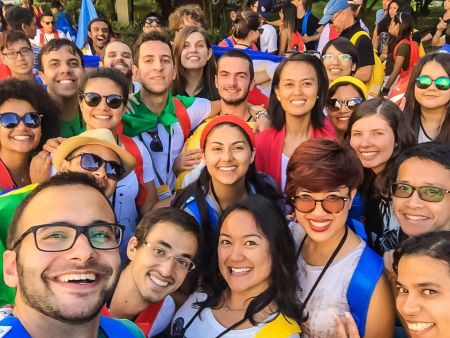
Aug 18, 2016 | Focolare Worldwide
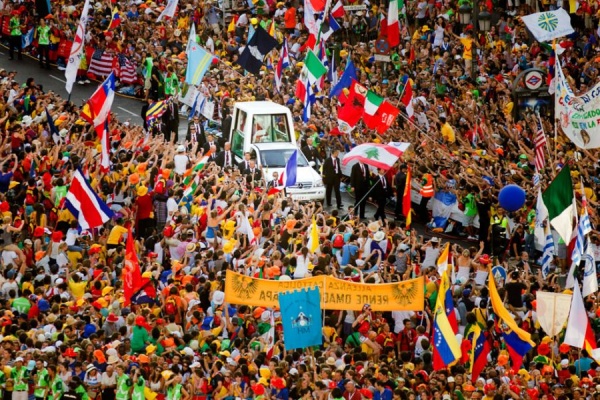 There was much enthusiasm, a desire to know more and to be protagonists of their future at Jasna, Slovakia on August 1-6. “We could never have dreamed that it would be like this. If we refuse to content ourselves with just being comfortable, if we are not couch potatoe Christians, then we will really be able to be protagonists of history,” said young Annita from Argentina when it was time to leave. “The courageous proposals that were offered by Pope Francis at WYD called for an immediate response, but also an understanding that would develop over time and that’s what we tried to do here at Jasna,” explained philosopher Gianluca Falconi. Along with theologian Michel Vandeleene and psychologist Antonella Deponte they offered a multi-disciplinary approach to the Pope’s proposals and how they could be implemented. Francesco from Krakow talked about fighting the fear of spreading peace in a world so filled with hatred. He talked about the value of mercy and of the Cross, of the obstacles that have to be overcome in order to encounter Jesus. But how could these challenges be translated concretely into daily life? The days together in Slovakia offered an opportunity to go into details, to examine the reasons behind things, to ask questions about one’s own life. The internationality of the group provided the possibility of a comparison with other parts of the world: from Lebanon to Australia, from France to the United States, from Russia to Ukraine. The organizers explain that “One of the strongest topics had nothing to do with the existence of God or the big questions of life, but the relationship with the other, the relationship with diversity. These were the themes around which the discussion developed. What came out were issues of a more personal kind, the innate value of each one of us, the chances and the difficulties that relationships with an other can represent, with an enemy, with someone who thinks differently.”
There was much enthusiasm, a desire to know more and to be protagonists of their future at Jasna, Slovakia on August 1-6. “We could never have dreamed that it would be like this. If we refuse to content ourselves with just being comfortable, if we are not couch potatoe Christians, then we will really be able to be protagonists of history,” said young Annita from Argentina when it was time to leave. “The courageous proposals that were offered by Pope Francis at WYD called for an immediate response, but also an understanding that would develop over time and that’s what we tried to do here at Jasna,” explained philosopher Gianluca Falconi. Along with theologian Michel Vandeleene and psychologist Antonella Deponte they offered a multi-disciplinary approach to the Pope’s proposals and how they could be implemented. Francesco from Krakow talked about fighting the fear of spreading peace in a world so filled with hatred. He talked about the value of mercy and of the Cross, of the obstacles that have to be overcome in order to encounter Jesus. But how could these challenges be translated concretely into daily life? The days together in Slovakia offered an opportunity to go into details, to examine the reasons behind things, to ask questions about one’s own life. The internationality of the group provided the possibility of a comparison with other parts of the world: from Lebanon to Australia, from France to the United States, from Russia to Ukraine. The organizers explain that “One of the strongest topics had nothing to do with the existence of God or the big questions of life, but the relationship with the other, the relationship with diversity. These were the themes around which the discussion developed. What came out were issues of a more personal kind, the innate value of each one of us, the chances and the difficulties that relationships with an other can represent, with an enemy, with someone who thinks differently.”  All the questions were based on personal experiences, like that of a young man from Iraq who highlighted the difficulties he is facing in relating to people from his own country. For some, a move in the direction of “the other” proved impossible. Therefore, smaller discussion groups were formed and also opportunities for personal conversations that were more spiritual, psychological or sociological. There were also discussions about the relationship with oneself, autonomy, personal dignity, feelings and open-mindedness. Another topic was the future: choosing a direction for one’s own life. This topic was discussed in a mixed group made up of teenagers, university students and workers, Christians from different Churches, agnostics, non-believers. They spoke in 13 languages and came from a variety of backgrounds, quite a diverse crowd, but alike in their thirst for truth. “It’s not the usual way young people present themselves in today’s society,” commented Gianluca who has had long experience in the field of education. Carla, an Italian remarked: “I’m 15 years old and there were people over thirty in my group. It’s beautiful because I had something to compare myself with, to ask for further explaining and feel assured.” It was an interweaving of generations, languages and cultures: “Philosophy isn’t very appreciated in my own country, because the approach to reality is different,” explained Antoine from Lebanon. “But I’m glad to be able to know other ways of thinking that are different from mine.” The young people take home with them an experience of fraternity that is the antidote to evil. Anna from Milan admits: “The Pope told us to never stop dreaming, and what we’re living now is a dream come true.”
All the questions were based on personal experiences, like that of a young man from Iraq who highlighted the difficulties he is facing in relating to people from his own country. For some, a move in the direction of “the other” proved impossible. Therefore, smaller discussion groups were formed and also opportunities for personal conversations that were more spiritual, psychological or sociological. There were also discussions about the relationship with oneself, autonomy, personal dignity, feelings and open-mindedness. Another topic was the future: choosing a direction for one’s own life. This topic was discussed in a mixed group made up of teenagers, university students and workers, Christians from different Churches, agnostics, non-believers. They spoke in 13 languages and came from a variety of backgrounds, quite a diverse crowd, but alike in their thirst for truth. “It’s not the usual way young people present themselves in today’s society,” commented Gianluca who has had long experience in the field of education. Carla, an Italian remarked: “I’m 15 years old and there were people over thirty in my group. It’s beautiful because I had something to compare myself with, to ask for further explaining and feel assured.” It was an interweaving of generations, languages and cultures: “Philosophy isn’t very appreciated in my own country, because the approach to reality is different,” explained Antoine from Lebanon. “But I’m glad to be able to know other ways of thinking that are different from mine.” The young people take home with them an experience of fraternity that is the antidote to evil. Anna from Milan admits: “The Pope told us to never stop dreaming, and what we’re living now is a dream come true.”
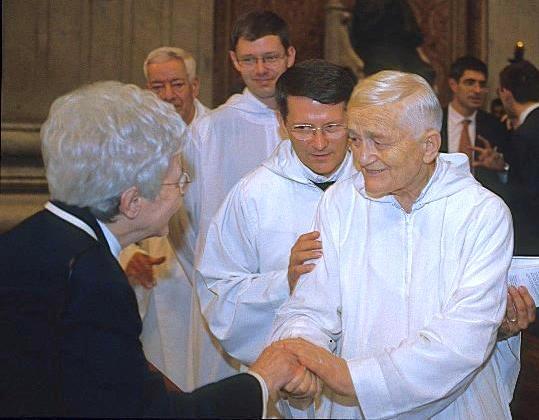
Aug 17, 2016 | Focolare Worldwide
 «Shocked by the news of the sudden death of our dear Frère Roger Schutz, we join the entire Community of Taize in this moment of prayer and deep pain. He had committed his whole life to God and his brethren, and has been crowned with the palm of martyrdom. Frère Roger was a constructor of peace, and a prophet of hope and joy. “God wants us to be happy,“ he had written to me about two months ago, and now we think of him in the fullness of joy in the heart of the Trinity. We are particularly close to you in this situation. We hope that the deep 40-year friendship with Frère Roger and the Community of Taizé, will continue even now that he has gone to Heaven.» Chiara Lubich So also today, we wish to remember him as a builder of peace, and a prophet of hope and joy.
«Shocked by the news of the sudden death of our dear Frère Roger Schutz, we join the entire Community of Taize in this moment of prayer and deep pain. He had committed his whole life to God and his brethren, and has been crowned with the palm of martyrdom. Frère Roger was a constructor of peace, and a prophet of hope and joy. “God wants us to be happy,“ he had written to me about two months ago, and now we think of him in the fullness of joy in the heart of the Trinity. We are particularly close to you in this situation. We hope that the deep 40-year friendship with Frère Roger and the Community of Taizé, will continue even now that he has gone to Heaven.» Chiara Lubich So also today, we wish to remember him as a builder of peace, and a prophet of hope and joy.
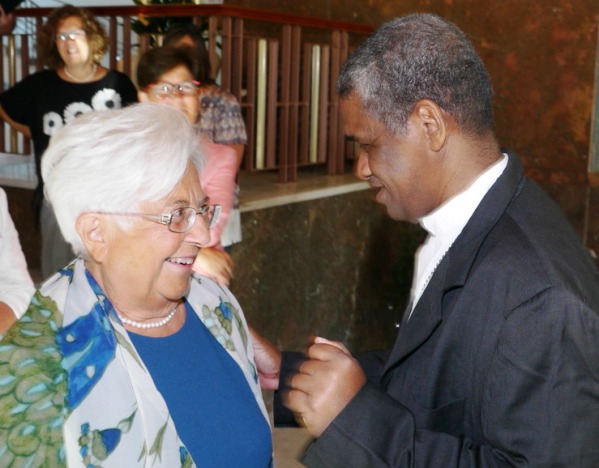
Aug 16, 2016 | Focolare Worldwide
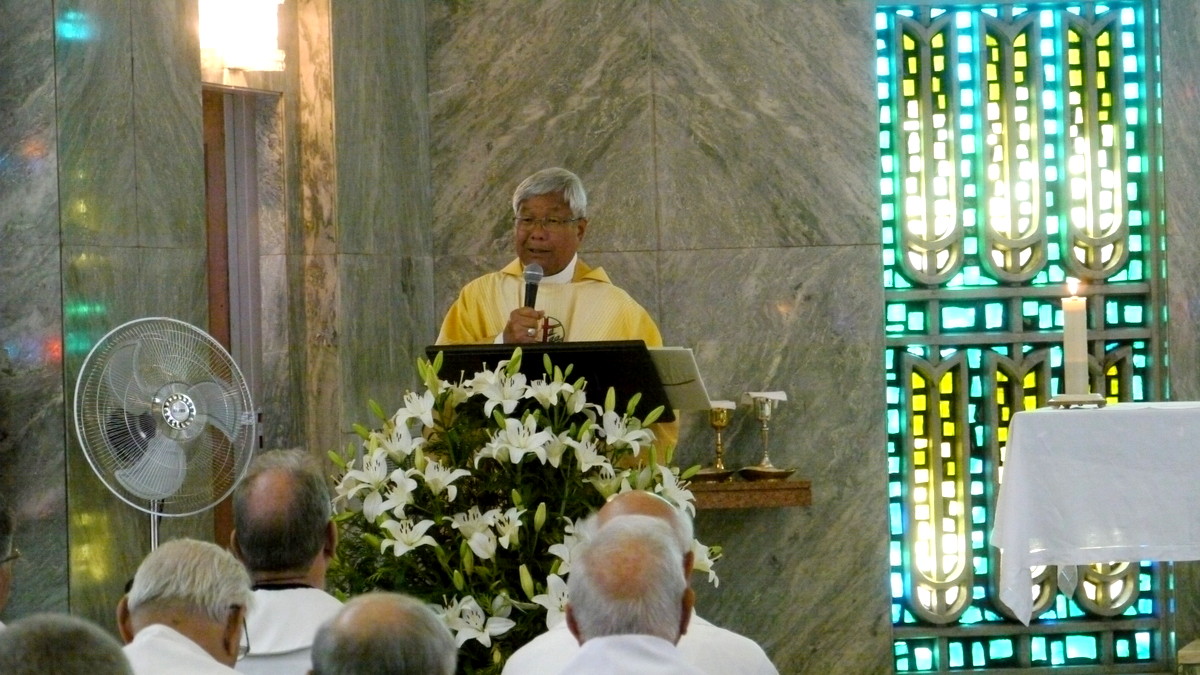 Every summer bishops from around the world gather for a preriod of rest and sharing of their lives while reflecting on being a Church that is instrument and sign of unity in the great variety of settings of the global society that is marked by so many tensions and contradictions. This year they met in Braga, Portugal. “In the Church today it is the moment of unity and communion, the moment when we are being invited to have a collective experience of God. We’re not here only because we’re each bishops, but because we’re brothers. We’d like to be a body of brothers like the first Apostles with Jesus.” These words were spoken by Cardinal João Bráz de Aviz during their Mass inside the Chapel of Apparitions as the 67 bishops from 27 countries made a pilgrimage to Fatima on August 4th.
Every summer bishops from around the world gather for a preriod of rest and sharing of their lives while reflecting on being a Church that is instrument and sign of unity in the great variety of settings of the global society that is marked by so many tensions and contradictions. This year they met in Braga, Portugal. “In the Church today it is the moment of unity and communion, the moment when we are being invited to have a collective experience of God. We’re not here only because we’re each bishops, but because we’re brothers. We’d like to be a body of brothers like the first Apostles with Jesus.” These words were spoken by Cardinal João Bráz de Aviz during their Mass inside the Chapel of Apparitions as the 67 bishops from 27 countries made a pilgrimage to Fatima on August 4th. 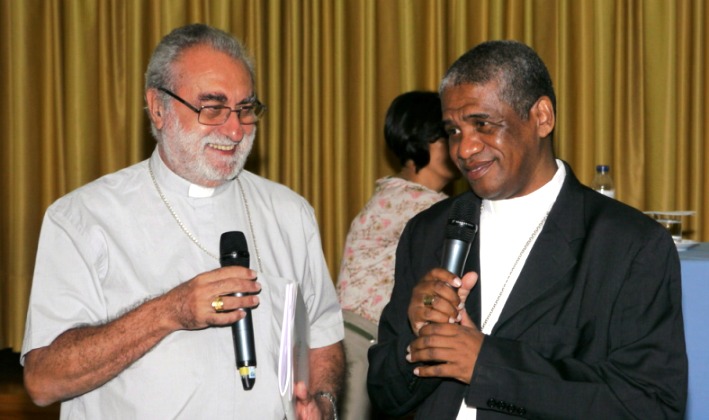 At the conclusion of the gathering Cardinal Francis Xavier Kriengsak Kovithavanij, Archbishop of Bangkok, Thailand summarized their experience in the following way: “We were really happy during these days. We’ve lived like brothers. We felt free and able to open our hearts to one another. Our only Teacher was truly among us. We felt that we were living in the house of Mary.” The bishops were welcomed at Mater Ecclesia Apostolic Centre near the Shrine of Our Lady of Sameiro, by Dom Jorge Ortiga, Archbishop of Braga. It was an appropriate setting for reflecting on the current world scene with international political expert Pasquale Ferrara, and the reform of the Church in the wake of Pope Francis with theologian Piero Coda. It was against this background that the bishops questioned themselves on how to be bishops with a synodal approach and put into practice a culture of shepherding that is marked by communion.
At the conclusion of the gathering Cardinal Francis Xavier Kriengsak Kovithavanij, Archbishop of Bangkok, Thailand summarized their experience in the following way: “We were really happy during these days. We’ve lived like brothers. We felt free and able to open our hearts to one another. Our only Teacher was truly among us. We felt that we were living in the house of Mary.” The bishops were welcomed at Mater Ecclesia Apostolic Centre near the Shrine of Our Lady of Sameiro, by Dom Jorge Ortiga, Archbishop of Braga. It was an appropriate setting for reflecting on the current world scene with international political expert Pasquale Ferrara, and the reform of the Church in the wake of Pope Francis with theologian Piero Coda. It was against this background that the bishops questioned themselves on how to be bishops with a synodal approach and put into practice a culture of shepherding that is marked by communion. 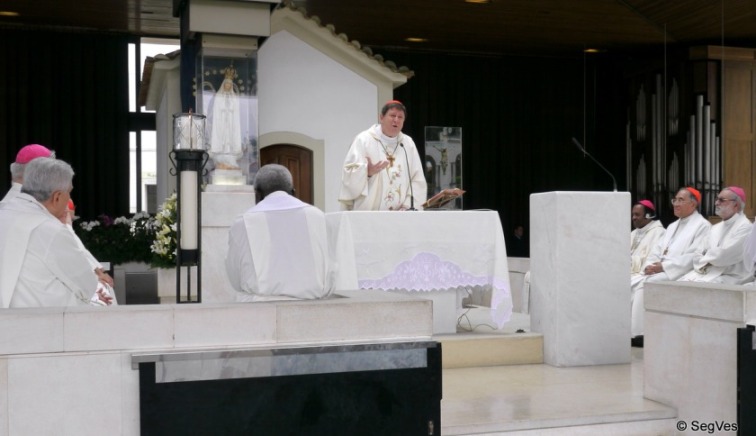 Plenary and small group meetings, walks and meals together were all opportunities to put in common painful situations and signs of hope: the anguished cry that rises from the Church in the Middle East; the growth of fruitful integration between basic ecclesial communities and new Movements and Communities in a large diocese of Brazil that offers a significant example of the Letter Iuvenescit Ecclesia (The Church that Rejuvinates), which was published in June by the Congregation for the Doctrine of the Faith; the challenges and potential of inculturation in a pluralistic context like India; the fruits that can come forth when a bishop and his auxiliaries live the common life and when a bishop manages to make himself a brother and friend of his priests; the arduous task of evangelization in a place like Madagascar that is marked by poverty.
Plenary and small group meetings, walks and meals together were all opportunities to put in common painful situations and signs of hope: the anguished cry that rises from the Church in the Middle East; the growth of fruitful integration between basic ecclesial communities and new Movements and Communities in a large diocese of Brazil that offers a significant example of the Letter Iuvenescit Ecclesia (The Church that Rejuvinates), which was published in June by the Congregation for the Doctrine of the Faith; the challenges and potential of inculturation in a pluralistic context like India; the fruits that can come forth when a bishop and his auxiliaries live the common life and when a bishop manages to make himself a brother and friend of his priests; the arduous task of evangelization in a place like Madagascar that is marked by poverty.  The two-day visit by bishops from other Churches – two Lutherans and one Syro-Orthodox – and an afternnon meeting with seven bishops from Portugal was mutually enriching. The spiritual part of the meeting had two main themes: Christ Crucified, which is one of the carindal points of the spirituality of unity; and love for the Church. These were presented in talks by Focolare president, Maria Voce (Jesus Forsaken, God’s Window & Humanity’s Window); and by co-president Jesús Morán (The Ecclesial Genius of Chiara Lubich and the Charism of Unity).
The two-day visit by bishops from other Churches – two Lutherans and one Syro-Orthodox – and an afternnon meeting with seven bishops from Portugal was mutually enriching. The spiritual part of the meeting had two main themes: Christ Crucified, which is one of the carindal points of the spirituality of unity; and love for the Church. These were presented in talks by Focolare president, Maria Voce (Jesus Forsaken, God’s Window & Humanity’s Window); and by co-president Jesús Morán (The Ecclesial Genius of Chiara Lubich and the Charism of Unity).
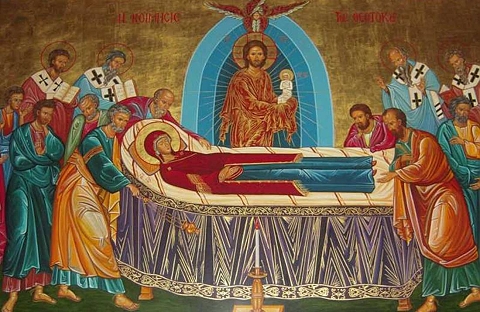
Aug 15, 2016 | Non categorizzato
 After Jesus had died and the Holy Spirit had appeared, Mary disappeared into obscurity. She had accomplished her mission and returned to living in her own element: silent service. She solved the problem of old age by seeking refuge in God, almost a second childhood of the spirit. She teaches how to die. The dying process that provokes fear, in Mary, the Mother, became a returning to her origins by constantly losing herself in God: Life that never ends. And that losing of herself in the Eternal was the death of Mary. It came on the day when the Apostles could do it on their own. But it wasn’t death as we intend it or experience it, but rather something short and sweet that theologians express with a variety of terms: pause, transition, transit, falling-asleep, life-giving-death. . . That virgin body would have been contaminated by the process of decomposition; whereas, having suffered with Christ it couldn’t but immediately rise to glory with Christ. What Resurrection was for Christ, the Assumption was for Mary: a double victory of body and spirit over death. In our times there is the terrifying spectre of the destruction of millions of human beings if not all humankind by atomic weapons, or environmental pollution. There is no way out of it other than reproducing the victory of Jesus and Mary. We must spiritually become Jesus and Mary, agents of life, and this is done by inserting our human nothingness into Divine omnipotence. If we join together in living the Gospel we become the mystical Christ, and if we are made Mary we give Jesus to society, and then war will no longer make sense and the atomic weapon will become a museum piece. There will be peace: the one heart and one soul of a community gathered around the Mother, and its blessed fruit will be unity, the unity of the Living. By rising from this bloody swamp of the earth, to the Heaven of Mary, the Fairest Star of the Sea, we come to a better understanding of the meaning of her Assumption which is the ultimate seal on her unique privilege as the Virgin Mother of God. The materialist should also be moved by this, since it represents the exaltation of the physical body by the power of the Spirit. In Mary we celebrate the redemption of matter and exalt the physical universe that is transfigured into a Temple of the Most High. It’s enough to contemplate even for a moment with the knowledge of love, the place of Mary who rises from earth to Heaven through the cosmos to the full grasp of her identity and of her role. She is the masterpiece of creation. Mary is humble, because no outward highness elevates her; silent, because no human voice seems to be able to define her; poor, because no earthly ornament seems able to decorate her. She speaks only with the language of God’s Word whose richness is only Wisdom of God, grand with the grandness of God. So identified with the Lord, Mary is the human expression of the greatness of the Trinity’s very mind and of its love. She is the Queen – Mistress and Servant – of the Lord’s Dwelling, who opens the doors and lets the children in, occupying herself with welcoming everyone into the palace of the Father, for the glory of the Son in the Seal of the Spirit. She provides mortals with an idea of God who infinitely dominates and overwhelms their intelligence. As if to mediate the power, the wisdom and the love of the ineffable Trinity, God wished to manifest all his power in her. In his infinite originality which humankind would never have tapped, the Creator invented Mary in whose womb the Eternal Word became flesh in our midst and, in his humanity, God became accessible and the Divine Love became part of our home life. Mary among us brings God into our midst. She is the Gate of Heaven. She is taken into Heaven in order to gather the children into the Father’s house. That is why they call on her even a hundred times a day, that she might pray for them now and at the hour of death. (Igino Giordani, Maria modello perfetto, (Rome: Città Nuova, 2012 [1967]), p. 157 – 163.
After Jesus had died and the Holy Spirit had appeared, Mary disappeared into obscurity. She had accomplished her mission and returned to living in her own element: silent service. She solved the problem of old age by seeking refuge in God, almost a second childhood of the spirit. She teaches how to die. The dying process that provokes fear, in Mary, the Mother, became a returning to her origins by constantly losing herself in God: Life that never ends. And that losing of herself in the Eternal was the death of Mary. It came on the day when the Apostles could do it on their own. But it wasn’t death as we intend it or experience it, but rather something short and sweet that theologians express with a variety of terms: pause, transition, transit, falling-asleep, life-giving-death. . . That virgin body would have been contaminated by the process of decomposition; whereas, having suffered with Christ it couldn’t but immediately rise to glory with Christ. What Resurrection was for Christ, the Assumption was for Mary: a double victory of body and spirit over death. In our times there is the terrifying spectre of the destruction of millions of human beings if not all humankind by atomic weapons, or environmental pollution. There is no way out of it other than reproducing the victory of Jesus and Mary. We must spiritually become Jesus and Mary, agents of life, and this is done by inserting our human nothingness into Divine omnipotence. If we join together in living the Gospel we become the mystical Christ, and if we are made Mary we give Jesus to society, and then war will no longer make sense and the atomic weapon will become a museum piece. There will be peace: the one heart and one soul of a community gathered around the Mother, and its blessed fruit will be unity, the unity of the Living. By rising from this bloody swamp of the earth, to the Heaven of Mary, the Fairest Star of the Sea, we come to a better understanding of the meaning of her Assumption which is the ultimate seal on her unique privilege as the Virgin Mother of God. The materialist should also be moved by this, since it represents the exaltation of the physical body by the power of the Spirit. In Mary we celebrate the redemption of matter and exalt the physical universe that is transfigured into a Temple of the Most High. It’s enough to contemplate even for a moment with the knowledge of love, the place of Mary who rises from earth to Heaven through the cosmos to the full grasp of her identity and of her role. She is the masterpiece of creation. Mary is humble, because no outward highness elevates her; silent, because no human voice seems to be able to define her; poor, because no earthly ornament seems able to decorate her. She speaks only with the language of God’s Word whose richness is only Wisdom of God, grand with the grandness of God. So identified with the Lord, Mary is the human expression of the greatness of the Trinity’s very mind and of its love. She is the Queen – Mistress and Servant – of the Lord’s Dwelling, who opens the doors and lets the children in, occupying herself with welcoming everyone into the palace of the Father, for the glory of the Son in the Seal of the Spirit. She provides mortals with an idea of God who infinitely dominates and overwhelms their intelligence. As if to mediate the power, the wisdom and the love of the ineffable Trinity, God wished to manifest all his power in her. In his infinite originality which humankind would never have tapped, the Creator invented Mary in whose womb the Eternal Word became flesh in our midst and, in his humanity, God became accessible and the Divine Love became part of our home life. Mary among us brings God into our midst. She is the Gate of Heaven. She is taken into Heaven in order to gather the children into the Father’s house. That is why they call on her even a hundred times a day, that she might pray for them now and at the hour of death. (Igino Giordani, Maria modello perfetto, (Rome: Città Nuova, 2012 [1967]), p. 157 – 163.

Aug 13, 2016 | Non categorizzato
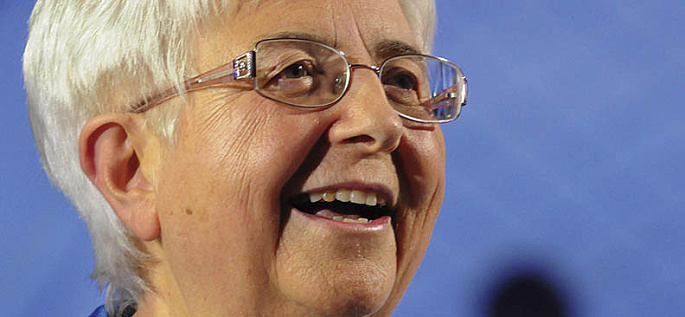 La prima reazione è stata di gratitudine. Nella Iuvenescit Ecclesia il Movimento dei Focolari vede un invito a proseguire nel cammino che l’ha accompagnato fino ad oggi. In particolare il richiamo alla «reciprocità tra doni gerarchici e doni carismatici», alla loro «coessenzialità» sembra interpretare appieno l’esperienza maturata, giorno dopo giorno, dalla nuova realtà ecclesiale fondata da Chiara Lubich. Con l’intervista a Maria Voce, presidente del Movimento dei Focolari, proseguiamo il ciclo dedicato all’approfondimento della lettera della Congregazione per la dottrina della fede, su cui nelle scorse settimane sono intervenuti Salvatore Martinez, presidente nazionale del Rinnovamento nello Spirito Santo e don Julián Carrón, presidente della Fraternità di Comunione e liberazione. «Il documento – sottolinea Maria Voce – parla chiaro: la Chiesa è una, è “un corpo” chiamato a incarnare il mistero di comunione della vita trinitaria. Protagonista del ringiovanimento della Chiesa è lo Spirito Santo che agisce, in particolare, attraverso i carismi. Il documento riconosce dunque ai movimenti una cosa importante: la capacità, se corrispondiamo alla grazia, di rivitalizzare la Chiesa. Con uno scopo chiaro: contribuire a immettere la vita di Dio negli ingranaggi della vita sociale, farla “toccare” dagli uomini e donne immersi nella complessità del nostro mondo. Il punto centrale del documento è la reciprocità, la coessenzialità nella vita della Chiesa tra doni gerarchici e doni carismatici. Si tratta di un richiamo esplicito all’insegnamento conciliare. Sì, mi pare che la lettera ponga in maniera inequivoca una pietra miliare di notevole portata dottrinale, sia nel riferirsi al Concilio Vaticano II, sia nel riconoscere una “convergenza del recente magistero ecclesiale” sulla coessenzialità: medesima origine e medesimo fine dei doni gerarchici e dei doni carismatici, tema che in questi anni non era stato recepito sufficientemente e aspettava un approfondimento.
La prima reazione è stata di gratitudine. Nella Iuvenescit Ecclesia il Movimento dei Focolari vede un invito a proseguire nel cammino che l’ha accompagnato fino ad oggi. In particolare il richiamo alla «reciprocità tra doni gerarchici e doni carismatici», alla loro «coessenzialità» sembra interpretare appieno l’esperienza maturata, giorno dopo giorno, dalla nuova realtà ecclesiale fondata da Chiara Lubich. Con l’intervista a Maria Voce, presidente del Movimento dei Focolari, proseguiamo il ciclo dedicato all’approfondimento della lettera della Congregazione per la dottrina della fede, su cui nelle scorse settimane sono intervenuti Salvatore Martinez, presidente nazionale del Rinnovamento nello Spirito Santo e don Julián Carrón, presidente della Fraternità di Comunione e liberazione. «Il documento – sottolinea Maria Voce – parla chiaro: la Chiesa è una, è “un corpo” chiamato a incarnare il mistero di comunione della vita trinitaria. Protagonista del ringiovanimento della Chiesa è lo Spirito Santo che agisce, in particolare, attraverso i carismi. Il documento riconosce dunque ai movimenti una cosa importante: la capacità, se corrispondiamo alla grazia, di rivitalizzare la Chiesa. Con uno scopo chiaro: contribuire a immettere la vita di Dio negli ingranaggi della vita sociale, farla “toccare” dagli uomini e donne immersi nella complessità del nostro mondo. Il punto centrale del documento è la reciprocità, la coessenzialità nella vita della Chiesa tra doni gerarchici e doni carismatici. Si tratta di un richiamo esplicito all’insegnamento conciliare. Sì, mi pare che la lettera ponga in maniera inequivoca una pietra miliare di notevole portata dottrinale, sia nel riferirsi al Concilio Vaticano II, sia nel riconoscere una “convergenza del recente magistero ecclesiale” sulla coessenzialità: medesima origine e medesimo fine dei doni gerarchici e dei doni carismatici, tema che in questi anni non era stato recepito sufficientemente e aspettava un approfondimento.  Una coessenzialità che voi sottolineate far parte da sempre della vostra esperienza. Dagli inizi il Movimento dei Focolari ha teso a questo intimo rapporto con chi nella Chiesa aveva il carisma del discernimento. Lo si vede, ad esempio, dalla lunga storia della sua approvazione, inseguita con determinazione adamantina e fiducia totale, a volte nella sofferenza, da Chiara Lubich e da quanti generavano con lei questa nuova creatura. La narra lei stessa nel suo libro “Il Grido”. I riconoscimenti poi, come si sa, sono arrivati abbondanti. Anche altri rappresentanti di Chiese cristiane hanno voluto esplicitare il proprio riconoscimento, a cominciare dal patriarca ecumenico Athenagoras I, dal vescovo luterano Hermann Dietzfelbinger, dal primate anglicano Michael Ramsey e da tanti altri. La lettera sottolinea che non può esistere contrapposizione tra Chiesa delle istituzioni e Chiesa della carità. Che significa da una parte rinunciare a ogni presunzione istituzionale, dall’altra all’autoreferenzialità. In che modo si possono evitare questi rischi? Vivendo ciascuno per lo scopo per cui la Chiesa esiste: l’umanità intera. Nel concreto e nel locale avviene poi il reciproco implementarsi con la ricchezza di ciascuno. La fraternità universale esige l’impegno di tutti e richiede infiniti piccoli passi. Dal 30 giugno al 2 luglio, ad esempio, 300 movimenti e comunità nati in seno alla Chiesa cattolica e a molte altre Chiese si sono dati appuntamento a Monaco, in Germania. ‘Insieme per l’Europa’, è un cammino iniziato nel 1999 e che continua insieme per il bene di questo continente, che deve riscoprire se stesso e ha gravi doveri verso il resto del mondo. E per realizzare l’armonia di cui parla il documento, come e dove bisogna operare? Credo che dobbiamo procedere con fiducia sulla strada che indica. Forse occorre approfondire maggiormente le conseguenze del riconoscere la coessenzialità tra doni gerarchici e carismatici. Bisogna pensare come avviare nella pratica una profonda e concreta partecipazione di ambedue aspetti ai vari livelli della Chiesa. Non basta la constatazione, mi sembra che si debbano trovare anche le modalità operative per procedere insieme. Uno slogan per il documento potrebbe essere quello di “Unirsi per una Chiesa in uscita”. Come interpretare questo impegno? Quella dei dialoghi è la via percorsa dai Focolari, manifestatisi via via con chiarezza, legati a fatti precisi e a incontri con persone concrete. Non quindi strategia, ma sostanza della relazione nel vicendevole riconoscimento e nel reciproco amore. Da qui il maturare del dialogo all’interno delle proprie Chiese, tra le chiese cristiane, con le altre religioni, con persone di riferimento non religioso, con la cultura contemporanea. Alcuni interpreti sottolineano come papa Francesco sia spesso un tantino severo verso i movimenti. È così? Non lo ritengo severo. Trovo sintonia fra le sue parole e gesti e il vissuto dei movimenti. È uno dei Papi che più è entrato in contatto con essi partecipando a manifestazioni o nelle udienze. Così con il Rinnovamento nello Spirito, Cammino Neocatecumenale, Comunione e Liberazione, Schoenstatt… Lo ha fatto anche con i Focolari ricevendo i 600 partecipanti all’Assemblea generale del 2014. Certe sue precisazioni che ad osservatori esterni possono risultare rimproveri, spronano i movimenti a vivere il proprio carisma, ad essere più fedeli allo Spirito Santo per meglio contribuire alla Chiesa comunione. Nitide le sue parole dello scorso aprile nella sua inaspettata visita alla Mariapoli di Roma a Villa Borghese. Con un’immagine, ha sottolineato l’importanza e la capacità dei movimenti di vivificare i vari ambienti: «trasformate i deserti in foresta». L’ultima parte del documento contiene l’invito a guardare a Maria. Un “richiamo” che in qualche modo fa parte del vostro stesso essere Movimento. Maria è la carismatica per eccellenza e ciò la pone al centro della Chiesa nascente, custode della presenza del Risorto fra gli apostoli che, in una Chiesa che non sapeva ancora di essere tale, solo lei poteva bene interpretare. «La dimensione mariana della Chiesa precede la sua dimensione petrina», scrive Giovanni Paolo II nella Mulieris dignitatem: infatti non siamo i cristiani a “fare” la Chiesa ma è il Risorto che ci precede. Da qui il richiamo al Movimento dei Focolari, chiamato dal suo specifico carisma a generare Gesù spiritualmente laddove i suoi membri vivono. Una vocazione descritta negli Statuti con parole forti: essere – per quanto è possibile – una continuazione di Maria, proprio in quella sua specifica opera di dare al mondo Cristo. Il vostro obiettivo, mi corregga se sbaglio, è edificare tutti insieme la civiltà nuova dell’amore. Dove bisogna operare soprattutto in questi tempi? Quali le periferie in cui è necessario essere presenti? Le periferie sono là dove c’è un di più di sofferenza. Papa Francesco non smette di indicarle. Non sono solo le povertà materiali ma anche quelle spirituali: la perdita di senso, lo smarrimento delle radici cristiane in un’Europa logorata dal consumismo, dall’edonismo, dal potere economico e tecnologico, la devastazione del creato, le stragi, il dramma umanitario dei rifugiati e le migrazioni di massa, i tanti conflitti armati. Le periferie sono infinite. Non si tratta di fare tutti insieme la stessa cosa, ma di lavorare insieme con lo stesso scopo: trasformare il deserto in foresta. Riccardo Maccioni, 7 agosto 2016 Pdf dell’intervista
Una coessenzialità che voi sottolineate far parte da sempre della vostra esperienza. Dagli inizi il Movimento dei Focolari ha teso a questo intimo rapporto con chi nella Chiesa aveva il carisma del discernimento. Lo si vede, ad esempio, dalla lunga storia della sua approvazione, inseguita con determinazione adamantina e fiducia totale, a volte nella sofferenza, da Chiara Lubich e da quanti generavano con lei questa nuova creatura. La narra lei stessa nel suo libro “Il Grido”. I riconoscimenti poi, come si sa, sono arrivati abbondanti. Anche altri rappresentanti di Chiese cristiane hanno voluto esplicitare il proprio riconoscimento, a cominciare dal patriarca ecumenico Athenagoras I, dal vescovo luterano Hermann Dietzfelbinger, dal primate anglicano Michael Ramsey e da tanti altri. La lettera sottolinea che non può esistere contrapposizione tra Chiesa delle istituzioni e Chiesa della carità. Che significa da una parte rinunciare a ogni presunzione istituzionale, dall’altra all’autoreferenzialità. In che modo si possono evitare questi rischi? Vivendo ciascuno per lo scopo per cui la Chiesa esiste: l’umanità intera. Nel concreto e nel locale avviene poi il reciproco implementarsi con la ricchezza di ciascuno. La fraternità universale esige l’impegno di tutti e richiede infiniti piccoli passi. Dal 30 giugno al 2 luglio, ad esempio, 300 movimenti e comunità nati in seno alla Chiesa cattolica e a molte altre Chiese si sono dati appuntamento a Monaco, in Germania. ‘Insieme per l’Europa’, è un cammino iniziato nel 1999 e che continua insieme per il bene di questo continente, che deve riscoprire se stesso e ha gravi doveri verso il resto del mondo. E per realizzare l’armonia di cui parla il documento, come e dove bisogna operare? Credo che dobbiamo procedere con fiducia sulla strada che indica. Forse occorre approfondire maggiormente le conseguenze del riconoscere la coessenzialità tra doni gerarchici e carismatici. Bisogna pensare come avviare nella pratica una profonda e concreta partecipazione di ambedue aspetti ai vari livelli della Chiesa. Non basta la constatazione, mi sembra che si debbano trovare anche le modalità operative per procedere insieme. Uno slogan per il documento potrebbe essere quello di “Unirsi per una Chiesa in uscita”. Come interpretare questo impegno? Quella dei dialoghi è la via percorsa dai Focolari, manifestatisi via via con chiarezza, legati a fatti precisi e a incontri con persone concrete. Non quindi strategia, ma sostanza della relazione nel vicendevole riconoscimento e nel reciproco amore. Da qui il maturare del dialogo all’interno delle proprie Chiese, tra le chiese cristiane, con le altre religioni, con persone di riferimento non religioso, con la cultura contemporanea. Alcuni interpreti sottolineano come papa Francesco sia spesso un tantino severo verso i movimenti. È così? Non lo ritengo severo. Trovo sintonia fra le sue parole e gesti e il vissuto dei movimenti. È uno dei Papi che più è entrato in contatto con essi partecipando a manifestazioni o nelle udienze. Così con il Rinnovamento nello Spirito, Cammino Neocatecumenale, Comunione e Liberazione, Schoenstatt… Lo ha fatto anche con i Focolari ricevendo i 600 partecipanti all’Assemblea generale del 2014. Certe sue precisazioni che ad osservatori esterni possono risultare rimproveri, spronano i movimenti a vivere il proprio carisma, ad essere più fedeli allo Spirito Santo per meglio contribuire alla Chiesa comunione. Nitide le sue parole dello scorso aprile nella sua inaspettata visita alla Mariapoli di Roma a Villa Borghese. Con un’immagine, ha sottolineato l’importanza e la capacità dei movimenti di vivificare i vari ambienti: «trasformate i deserti in foresta». L’ultima parte del documento contiene l’invito a guardare a Maria. Un “richiamo” che in qualche modo fa parte del vostro stesso essere Movimento. Maria è la carismatica per eccellenza e ciò la pone al centro della Chiesa nascente, custode della presenza del Risorto fra gli apostoli che, in una Chiesa che non sapeva ancora di essere tale, solo lei poteva bene interpretare. «La dimensione mariana della Chiesa precede la sua dimensione petrina», scrive Giovanni Paolo II nella Mulieris dignitatem: infatti non siamo i cristiani a “fare” la Chiesa ma è il Risorto che ci precede. Da qui il richiamo al Movimento dei Focolari, chiamato dal suo specifico carisma a generare Gesù spiritualmente laddove i suoi membri vivono. Una vocazione descritta negli Statuti con parole forti: essere – per quanto è possibile – una continuazione di Maria, proprio in quella sua specifica opera di dare al mondo Cristo. Il vostro obiettivo, mi corregga se sbaglio, è edificare tutti insieme la civiltà nuova dell’amore. Dove bisogna operare soprattutto in questi tempi? Quali le periferie in cui è necessario essere presenti? Le periferie sono là dove c’è un di più di sofferenza. Papa Francesco non smette di indicarle. Non sono solo le povertà materiali ma anche quelle spirituali: la perdita di senso, lo smarrimento delle radici cristiane in un’Europa logorata dal consumismo, dall’edonismo, dal potere economico e tecnologico, la devastazione del creato, le stragi, il dramma umanitario dei rifugiati e le migrazioni di massa, i tanti conflitti armati. Le periferie sono infinite. Non si tratta di fare tutti insieme la stessa cosa, ma di lavorare insieme con lo stesso scopo: trasformare il deserto in foresta. Riccardo Maccioni, 7 agosto 2016 Pdf dell’intervista
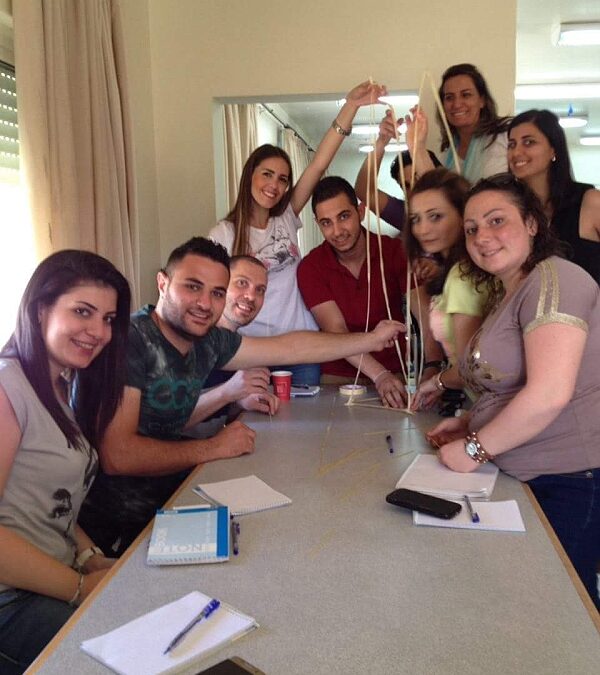
Aug 12, 2016 | Focolare Worldwide
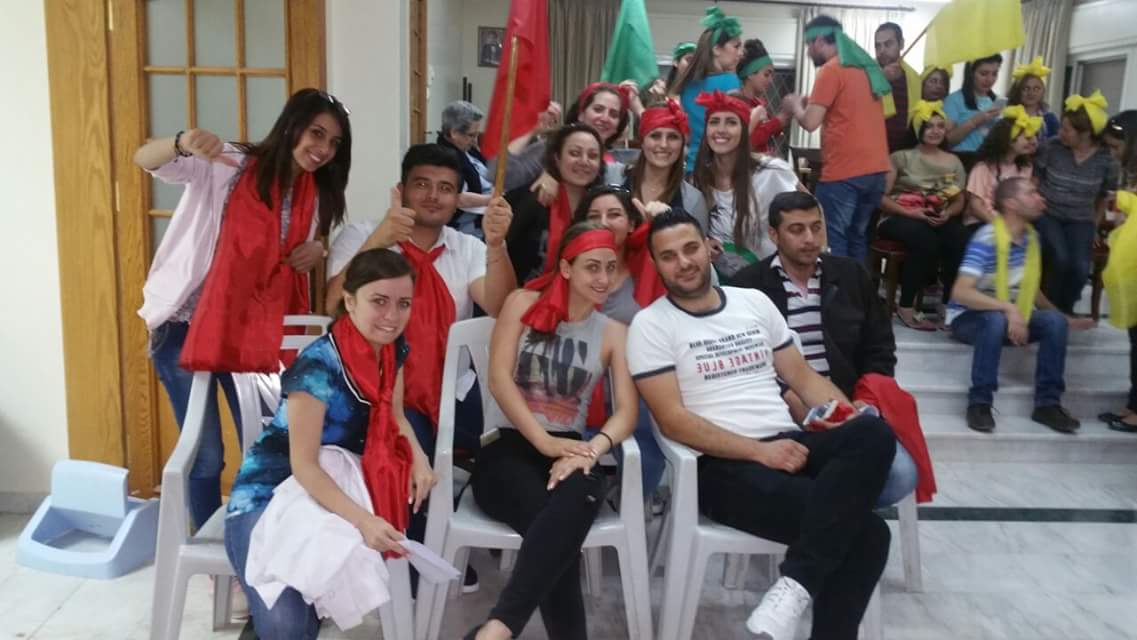 “I learned to transform the negative into positive and transmit it to my friends and not to despair in the face of difficulties.” Said in a context like that of Syria, where the young people live “under continuous psychological pressure” each word weighs differently. “Sad to say, there is continuous news from Syria about civilian war victims, especially in Aleppo,” Pope Francis reminded all once again in the Angelus of 7 August. He continued saying “It is unacceptable that many innocent people – and many children – have to pay the price of the conflict, which is that of closed hearts and the lack of will of those in power.” He then urged all to take everything to heart and personally support the Syrian brothers and sisters with their prayers and solidarity. War is stressful even if there are seeds of hope, and it is what we must continue to focus on. “We felt that we had to do something different with the youth, to support them from the spiritual and human standpoint,” recounted Lina Morcosand Murad Al Shawareb, educators of the Focolare Movement, «and this is why we thought of inviting Sr Noha Daccache, Lebanese, of the Sacred Heart, and university professor specialising in social sciences. We chose to deepen, in this year of mercy, the concept of “Mercy and prayer in our daily lives.”
“I learned to transform the negative into positive and transmit it to my friends and not to despair in the face of difficulties.” Said in a context like that of Syria, where the young people live “under continuous psychological pressure” each word weighs differently. “Sad to say, there is continuous news from Syria about civilian war victims, especially in Aleppo,” Pope Francis reminded all once again in the Angelus of 7 August. He continued saying “It is unacceptable that many innocent people – and many children – have to pay the price of the conflict, which is that of closed hearts and the lack of will of those in power.” He then urged all to take everything to heart and personally support the Syrian brothers and sisters with their prayers and solidarity. War is stressful even if there are seeds of hope, and it is what we must continue to focus on. “We felt that we had to do something different with the youth, to support them from the spiritual and human standpoint,” recounted Lina Morcosand Murad Al Shawareb, educators of the Focolare Movement, «and this is why we thought of inviting Sr Noha Daccache, Lebanese, of the Sacred Heart, and university professor specialising in social sciences. We chose to deepen, in this year of mercy, the concept of “Mercy and prayer in our daily lives.” 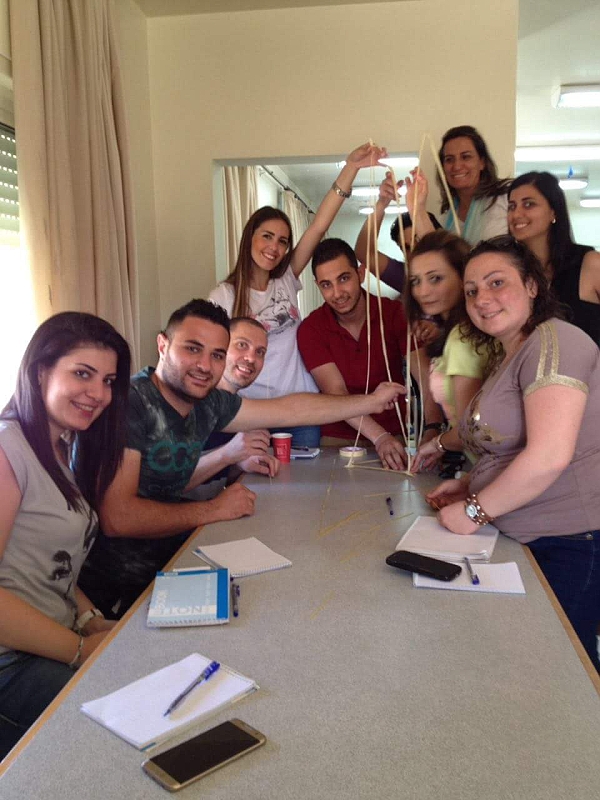 “Already during the preparations – through the iPhone application WhatsApp – there was a great sense of maturity,” seen also during the three-day event (from 10 to 12 June). Sr Noha’s reflections on mercy and prayer, and the Sacred Scriptures also seen in relation to their spiritual lives, triggered questions and reflections. “But on the first day we realised that we were all stressed out due to the situation we were undergoing. So we first held a dialogue session, after which someone suggested a moment of prayer. It was a moving moment with songs and meditations, where the youth said spontaneous prayers and with faith, asked for the gift of Peace.” “On the second day, we delved deeper into the various aspects of life that hindered us from fully corresponding to what God asks of us each day. On the last day instead, Chiara Lubich’s article, ‘Better than yesterday’, was really enlightening since it gave us a concrete key to always love Jesus better.” A girl wrote, “I understood that I had to live the present moment solemnly, to offer the pain and live it for Jesus; all the rest is secondary. While praying I felt that Jesus was saying to me: I am with you.” As she was leaving, Sr Caccache said “You people are really outstanding – I shall keep you in my heart and pray intensely for Peace.” Maria Chiara De Lorenzo
“Already during the preparations – through the iPhone application WhatsApp – there was a great sense of maturity,” seen also during the three-day event (from 10 to 12 June). Sr Noha’s reflections on mercy and prayer, and the Sacred Scriptures also seen in relation to their spiritual lives, triggered questions and reflections. “But on the first day we realised that we were all stressed out due to the situation we were undergoing. So we first held a dialogue session, after which someone suggested a moment of prayer. It was a moving moment with songs and meditations, where the youth said spontaneous prayers and with faith, asked for the gift of Peace.” “On the second day, we delved deeper into the various aspects of life that hindered us from fully corresponding to what God asks of us each day. On the last day instead, Chiara Lubich’s article, ‘Better than yesterday’, was really enlightening since it gave us a concrete key to always love Jesus better.” A girl wrote, “I understood that I had to live the present moment solemnly, to offer the pain and live it for Jesus; all the rest is secondary. While praying I felt that Jesus was saying to me: I am with you.” As she was leaving, Sr Caccache said “You people are really outstanding – I shall keep you in my heart and pray intensely for Peace.” Maria Chiara De Lorenzo

 Taking two years to build, with costs that reached €409,559, the new maternity wing of the Medical Centre, “Moyimwa Ntongo” in the Congolese capital was inaugurated precisely on the Centre’s 10th anniversary. The first infant was born last 29 April! It is an essential service, considering that – as the Health Director, Arthur Ngoy affirmed – the mortality rate of infants and mothers in Congo are still very high:”846 maternal deaths over every 100,000 live births” – while the world average is 216 – “and 104 out of 1,000 are the deaths of infants”, one of the highest rates worldwide. “The new department was built through the efforts of several people and agencies related to the Focolare Movement such as the Giancarlo Pallavicini Foundation; Albina Gianotti and Victorina Giussani who have been sponsors of the Medical Centre since the beginning; AMU-Luxembourg and AECOM Congo along with their supporters; many people in Luxembourg, including children who have made and sold small knick-knacks and done odd jobs to earn some money even in winter.” “This medical centre gives us the opportunity to respond concretely to the invitation of the Church in the document, AfricaeMunus (n.140), that urges all the healthcare institutions of the Church and all the people working in these organisations in the most varied roles, to try to see in every patient,a suffering member of the Body of Christ,” affirmed Damien Kasereka, co-director with Ghislaine Kahambu, of the Focolare Movement in Congo.
Taking two years to build, with costs that reached €409,559, the new maternity wing of the Medical Centre, “Moyimwa Ntongo” in the Congolese capital was inaugurated precisely on the Centre’s 10th anniversary. The first infant was born last 29 April! It is an essential service, considering that – as the Health Director, Arthur Ngoy affirmed – the mortality rate of infants and mothers in Congo are still very high:”846 maternal deaths over every 100,000 live births” – while the world average is 216 – “and 104 out of 1,000 are the deaths of infants”, one of the highest rates worldwide. “The new department was built through the efforts of several people and agencies related to the Focolare Movement such as the Giancarlo Pallavicini Foundation; Albina Gianotti and Victorina Giussani who have been sponsors of the Medical Centre since the beginning; AMU-Luxembourg and AECOM Congo along with their supporters; many people in Luxembourg, including children who have made and sold small knick-knacks and done odd jobs to earn some money even in winter.” “This medical centre gives us the opportunity to respond concretely to the invitation of the Church in the document, AfricaeMunus (n.140), that urges all the healthcare institutions of the Church and all the people working in these organisations in the most varied roles, to try to see in every patient,a suffering member of the Body of Christ,” affirmed Damien Kasereka, co-director with Ghislaine Kahambu, of the Focolare Movement in Congo.  “It is a huge satisfaction, “Dr Ngoy commented, “especially for the mothers who had to be transferred to another facility to give birth, after nine months of prenatal checkups in our centre.They felt they were being abandoned just when they most needed us.But it is also because we can respond to the Congolese government’s request to offer complete, continuous and quality treatments. This is why we thank Chiara Lubich who established this centre.” At the inauguration last 9 July,together with the medical team, patients, civil and religious authorities, architect and his team, and journalists, there was also a small delegation from AMU Luxembourg. The thanksgiving mass was celebrated by the auxiliary bishop of Kinshasa, Bishop Bodika, while the ribbon was cut by the Health Minister, Vital Kabuiku, together with the Apostolic Nuncio, Luis Mariano Montemayor, and the auxiliary bishop.
“It is a huge satisfaction, “Dr Ngoy commented, “especially for the mothers who had to be transferred to another facility to give birth, after nine months of prenatal checkups in our centre.They felt they were being abandoned just when they most needed us.But it is also because we can respond to the Congolese government’s request to offer complete, continuous and quality treatments. This is why we thank Chiara Lubich who established this centre.” At the inauguration last 9 July,together with the medical team, patients, civil and religious authorities, architect and his team, and journalists, there was also a small delegation from AMU Luxembourg. The thanksgiving mass was celebrated by the auxiliary bishop of Kinshasa, Bishop Bodika, while the ribbon was cut by the Health Minister, Vital Kabuiku, together with the Apostolic Nuncio, Luis Mariano Montemayor, and the auxiliary bishop.

 “We live in a world where anxiety and fear are inwardly and also physically destroying us. Let’s try together to bring about a rebirth of goodness and constructive relationships in the pursuit of the common good. I know we’re only like a small drop in the ocean, but just think of a drop of dye when it’s added to a bit of water: the water moves towards the colour of the dye.” This is how Manfred, who attended the Summer School, summarized the event that was organized by
“We live in a world where anxiety and fear are inwardly and also physically destroying us. Let’s try together to bring about a rebirth of goodness and constructive relationships in the pursuit of the common good. I know we’re only like a small drop in the ocean, but just think of a drop of dye when it’s added to a bit of water: the water moves towards the colour of the dye.” This is how Manfred, who attended the Summer School, summarized the event that was organized by 








 Every summer bishops from around the world gather for a preriod of rest and sharing of their lives while reflecting on being a Church that is instrument and sign of unity in the great variety of settings of the global society that is marked by so many tensions and contradictions. This year they met in Braga, Portugal. “In the Church today it is the moment of unity and communion, the moment when we are being invited to have a collective experience of God. We’re not here only because we’re each bishops, but because we’re brothers. We’d like to be a body of brothers like the first Apostles with Jesus.” These words were spoken by Cardinal João Bráz de Aviz during their Mass inside the Chapel of Apparitions as the 67 bishops from 27 countries made a pilgrimage to Fatima on August 4th.
Every summer bishops from around the world gather for a preriod of rest and sharing of their lives while reflecting on being a Church that is instrument and sign of unity in the great variety of settings of the global society that is marked by so many tensions and contradictions. This year they met in Braga, Portugal. “In the Church today it is the moment of unity and communion, the moment when we are being invited to have a collective experience of God. We’re not here only because we’re each bishops, but because we’re brothers. We’d like to be a body of brothers like the first Apostles with Jesus.” These words were spoken by Cardinal João Bráz de Aviz during their Mass inside the Chapel of Apparitions as the 67 bishops from 27 countries made a pilgrimage to Fatima on August 4th.  At the conclusion of the gathering Cardinal Francis Xavier Kriengsak Kovithavanij, Archbishop of Bangkok,
At the conclusion of the gathering Cardinal Francis Xavier Kriengsak Kovithavanij, Archbishop of Bangkok,  Plenary and small group meetings, walks and meals together were all opportunities to put in common painful situations and signs of hope: the anguished cry that rises from the Church in the Middle East; the growth of fruitful integration between basic ecclesial communities and new Movements and Communities in a large diocese of
Plenary and small group meetings, walks and meals together were all opportunities to put in common painful situations and signs of hope: the anguished cry that rises from the Church in the Middle East; the growth of fruitful integration between basic ecclesial communities and new Movements and Communities in a large diocese of 

 La prima reazione è stata di gratitudine. Nella
La prima reazione è stata di gratitudine. Nella  Una coessenzialità che voi sottolineate far parte da sempre della vostra esperienza. Dagli inizi il Movimento dei Focolari ha teso a questo intimo rapporto con chi nella Chiesa aveva il carisma del discernimento. Lo si vede, ad esempio, dalla lunga storia della sua approvazione, inseguita con determinazione adamantina e fiducia totale, a volte nella sofferenza, da Chiara Lubich e da quanti generavano con lei questa nuova creatura. La narra lei stessa nel suo libro “Il Grido”. I riconoscimenti poi, come si sa, sono arrivati abbondanti. Anche altri rappresentanti di Chiese cristiane hanno voluto esplicitare il proprio riconoscimento, a cominciare dal patriarca ecumenico Athenagoras I, dal vescovo luterano Hermann Dietzfelbinger, dal primate anglicano Michael Ramsey e da tanti altri. La lettera sottolinea che non può esistere contrapposizione tra Chiesa delle istituzioni e Chiesa della carità. Che significa da una parte rinunciare a ogni presunzione istituzionale, dall’altra all’autoreferenzialità. In che modo si possono evitare questi rischi? Vivendo ciascuno per lo scopo per cui la Chiesa esiste: l’umanità intera. Nel concreto e nel locale avviene poi il reciproco implementarsi con la ricchezza di ciascuno. La fraternità universale esige l’impegno di tutti e richiede infiniti piccoli passi. Dal 30 giugno al 2 luglio, ad esempio, 300 movimenti e comunità nati in seno alla Chiesa cattolica e a molte altre Chiese si sono dati appuntamento a Monaco, in Germania. ‘Insieme per l’Europa’, è un cammino iniziato nel 1999 e che continua insieme per il bene di questo continente, che deve riscoprire se stesso e ha gravi doveri verso il resto del mondo. E per realizzare l’armonia di cui parla il documento, come e dove bisogna operare? Credo che dobbiamo procedere con fiducia sulla strada che indica. Forse occorre approfondire maggiormente le conseguenze del riconoscere la coessenzialità tra doni gerarchici e carismatici. Bisogna pensare come avviare nella pratica una profonda e concreta partecipazione di ambedue aspetti ai vari livelli della Chiesa. Non basta la constatazione, mi sembra che si debbano trovare anche le modalità operative per procedere insieme. Uno slogan per il documento potrebbe essere quello di “Unirsi per una Chiesa in uscita”. Come interpretare questo impegno? Quella dei dialoghi è la via percorsa dai Focolari, manifestatisi via via con chiarezza, legati a fatti precisi e a incontri con persone concrete. Non quindi strategia, ma sostanza della relazione nel vicendevole riconoscimento e nel reciproco amore. Da qui il maturare del dialogo all’interno delle proprie Chiese, tra le chiese cristiane, con le altre religioni, con persone di riferimento non religioso, con la cultura contemporanea. Alcuni interpreti sottolineano come papa Francesco sia spesso un tantino severo verso i movimenti. È così? Non lo ritengo severo. Trovo sintonia fra le sue parole e gesti e il vissuto dei movimenti. È uno dei Papi che più è entrato in contatto con essi partecipando a manifestazioni o nelle udienze. Così con il Rinnovamento nello Spirito, Cammino Neocatecumenale, Comunione e Liberazione, Schoenstatt… Lo ha fatto anche con i Focolari ricevendo i 600 partecipanti all’Assemblea generale del 2014. Certe sue precisazioni che ad osservatori esterni possono risultare rimproveri, spronano i movimenti a vivere il proprio carisma, ad essere più fedeli allo Spirito Santo per meglio contribuire alla Chiesa comunione. Nitide le sue parole dello scorso aprile nella sua inaspettata visita alla Mariapoli di Roma a Villa Borghese. Con un’immagine, ha sottolineato l’importanza e la capacità dei movimenti di vivificare i vari ambienti: «trasformate i deserti in foresta». L’ultima parte del documento contiene l’invito a guardare a Maria. Un “richiamo” che in qualche modo fa parte del vostro stesso essere Movimento. Maria è la carismatica per eccellenza e ciò la pone al centro della Chiesa nascente, custode della presenza del Risorto fra gli apostoli che, in una Chiesa che non sapeva ancora di essere tale, solo lei poteva bene interpretare. «La dimensione mariana della Chiesa precede la sua dimensione petrina», scrive Giovanni Paolo II nella Mulieris dignitatem: infatti non siamo i cristiani a “fare” la Chiesa ma è il Risorto che ci precede. Da qui il richiamo al Movimento dei Focolari, chiamato dal suo specifico carisma a generare Gesù spiritualmente laddove i suoi membri vivono. Una vocazione descritta negli Statuti con parole forti: essere – per quanto è possibile – una continuazione di Maria, proprio in quella sua specifica opera di dare al mondo Cristo. Il vostro obiettivo, mi corregga se sbaglio, è edificare tutti insieme la civiltà nuova dell’amore. Dove bisogna operare soprattutto in questi tempi? Quali le periferie in cui è necessario essere presenti? Le periferie sono là dove c’è un di più di sofferenza. Papa Francesco non smette di indicarle. Non sono solo le povertà materiali ma anche quelle spirituali: la perdita di senso, lo smarrimento delle radici cristiane in un’Europa logorata dal consumismo, dall’edonismo, dal potere economico e tecnologico, la devastazione del creato, le stragi, il dramma umanitario dei rifugiati e le migrazioni di massa, i tanti conflitti armati. Le periferie sono infinite. Non si tratta di fare tutti insieme la stessa cosa, ma di lavorare insieme con lo stesso scopo: trasformare il deserto in foresta. Riccardo Maccioni, 7 agosto 2016
Una coessenzialità che voi sottolineate far parte da sempre della vostra esperienza. Dagli inizi il Movimento dei Focolari ha teso a questo intimo rapporto con chi nella Chiesa aveva il carisma del discernimento. Lo si vede, ad esempio, dalla lunga storia della sua approvazione, inseguita con determinazione adamantina e fiducia totale, a volte nella sofferenza, da Chiara Lubich e da quanti generavano con lei questa nuova creatura. La narra lei stessa nel suo libro “Il Grido”. I riconoscimenti poi, come si sa, sono arrivati abbondanti. Anche altri rappresentanti di Chiese cristiane hanno voluto esplicitare il proprio riconoscimento, a cominciare dal patriarca ecumenico Athenagoras I, dal vescovo luterano Hermann Dietzfelbinger, dal primate anglicano Michael Ramsey e da tanti altri. La lettera sottolinea che non può esistere contrapposizione tra Chiesa delle istituzioni e Chiesa della carità. Che significa da una parte rinunciare a ogni presunzione istituzionale, dall’altra all’autoreferenzialità. In che modo si possono evitare questi rischi? Vivendo ciascuno per lo scopo per cui la Chiesa esiste: l’umanità intera. Nel concreto e nel locale avviene poi il reciproco implementarsi con la ricchezza di ciascuno. La fraternità universale esige l’impegno di tutti e richiede infiniti piccoli passi. Dal 30 giugno al 2 luglio, ad esempio, 300 movimenti e comunità nati in seno alla Chiesa cattolica e a molte altre Chiese si sono dati appuntamento a Monaco, in Germania. ‘Insieme per l’Europa’, è un cammino iniziato nel 1999 e che continua insieme per il bene di questo continente, che deve riscoprire se stesso e ha gravi doveri verso il resto del mondo. E per realizzare l’armonia di cui parla il documento, come e dove bisogna operare? Credo che dobbiamo procedere con fiducia sulla strada che indica. Forse occorre approfondire maggiormente le conseguenze del riconoscere la coessenzialità tra doni gerarchici e carismatici. Bisogna pensare come avviare nella pratica una profonda e concreta partecipazione di ambedue aspetti ai vari livelli della Chiesa. Non basta la constatazione, mi sembra che si debbano trovare anche le modalità operative per procedere insieme. Uno slogan per il documento potrebbe essere quello di “Unirsi per una Chiesa in uscita”. Come interpretare questo impegno? Quella dei dialoghi è la via percorsa dai Focolari, manifestatisi via via con chiarezza, legati a fatti precisi e a incontri con persone concrete. Non quindi strategia, ma sostanza della relazione nel vicendevole riconoscimento e nel reciproco amore. Da qui il maturare del dialogo all’interno delle proprie Chiese, tra le chiese cristiane, con le altre religioni, con persone di riferimento non religioso, con la cultura contemporanea. Alcuni interpreti sottolineano come papa Francesco sia spesso un tantino severo verso i movimenti. È così? Non lo ritengo severo. Trovo sintonia fra le sue parole e gesti e il vissuto dei movimenti. È uno dei Papi che più è entrato in contatto con essi partecipando a manifestazioni o nelle udienze. Così con il Rinnovamento nello Spirito, Cammino Neocatecumenale, Comunione e Liberazione, Schoenstatt… Lo ha fatto anche con i Focolari ricevendo i 600 partecipanti all’Assemblea generale del 2014. Certe sue precisazioni che ad osservatori esterni possono risultare rimproveri, spronano i movimenti a vivere il proprio carisma, ad essere più fedeli allo Spirito Santo per meglio contribuire alla Chiesa comunione. Nitide le sue parole dello scorso aprile nella sua inaspettata visita alla Mariapoli di Roma a Villa Borghese. Con un’immagine, ha sottolineato l’importanza e la capacità dei movimenti di vivificare i vari ambienti: «trasformate i deserti in foresta». L’ultima parte del documento contiene l’invito a guardare a Maria. Un “richiamo” che in qualche modo fa parte del vostro stesso essere Movimento. Maria è la carismatica per eccellenza e ciò la pone al centro della Chiesa nascente, custode della presenza del Risorto fra gli apostoli che, in una Chiesa che non sapeva ancora di essere tale, solo lei poteva bene interpretare. «La dimensione mariana della Chiesa precede la sua dimensione petrina», scrive Giovanni Paolo II nella Mulieris dignitatem: infatti non siamo i cristiani a “fare” la Chiesa ma è il Risorto che ci precede. Da qui il richiamo al Movimento dei Focolari, chiamato dal suo specifico carisma a generare Gesù spiritualmente laddove i suoi membri vivono. Una vocazione descritta negli Statuti con parole forti: essere – per quanto è possibile – una continuazione di Maria, proprio in quella sua specifica opera di dare al mondo Cristo. Il vostro obiettivo, mi corregga se sbaglio, è edificare tutti insieme la civiltà nuova dell’amore. Dove bisogna operare soprattutto in questi tempi? Quali le periferie in cui è necessario essere presenti? Le periferie sono là dove c’è un di più di sofferenza. Papa Francesco non smette di indicarle. Non sono solo le povertà materiali ma anche quelle spirituali: la perdita di senso, lo smarrimento delle radici cristiane in un’Europa logorata dal consumismo, dall’edonismo, dal potere economico e tecnologico, la devastazione del creato, le stragi, il dramma umanitario dei rifugiati e le migrazioni di massa, i tanti conflitti armati. Le periferie sono infinite. Non si tratta di fare tutti insieme la stessa cosa, ma di lavorare insieme con lo stesso scopo: trasformare il deserto in foresta. Riccardo Maccioni, 7 agosto 2016 

